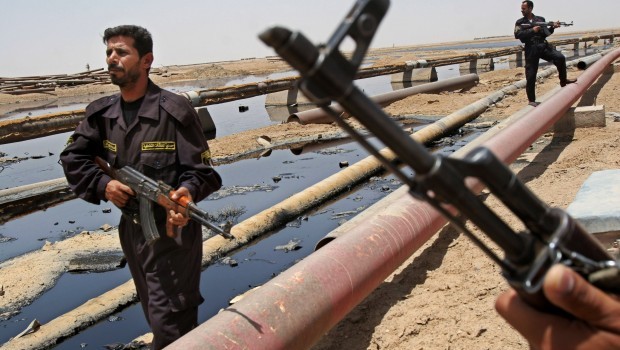
In this June 22, 2008, file photo, Iraqi police officers protecting oil installations secure an oil pipeline from the Rumailah refinery, north of Basra, Iraq. (AP Photo/Nabil al-Jurani)
Erbil, Asharq Al-Awsat—An official source from the Ministry of Natural Resources in the Kurdish Regional Government denied reports that the Kurdish government is exporting Iraqi crude oil to Asian territories via Iranian territory.
The source confirmed that “the quantities that are exported by truck to Iran every day are not crude oil, but black oil—a remnant of the filtering process that takes place at the Baiji refinery. Civil companies in the private sector purchase this oil from the refinery and sell it to Asia and Pakistan via Iranian ports. This process—which has taken place for years, with the knowledge of the federal government—has nothing to do with us.”
In an exclusive statement to Asharq Al-Awsat, the source clarified that civil companies contracted with the federal government to buy black oil from Iraqi refineries. This type of oil cannot be used locally.
The companies themselves transport the oil derivative to Iran by road. From there they are transferred to the Abbas Port and then shipped to a number of Asian countries.
“Concerning the ports that export oil from Kurdish oilfields, there are Iraqi pipelines that transport oil to Turkish ports. There is an additional pipeline that we have been working on for the last few months that will also transport oil to Turkish ports,” the source explained.
“According to the strategic plan of the natural resources ministry, all Kurdish pipelines that head towards the Mediterranean Sea pass through Turkish territory. Exports do not arrive at Iranian territory in any quantity because the process is too expensive and does not have economic viability.”
“The goal of the pipeline, which we have been working on for a period of time, is to open new marketing outlets for Kurdish oil.”
The pipeline is due for completion in September.
The Kurdish official also commented on what some international agencies had reported about the Kurdish Regional Government agreeing to allow crude oil to be exported via Iranian pipelines.
The source pointed out that “over the last two months, crude was transported by truck from Kurdish oilfields at the northern border to the Imam Khomeini Port, which is situated 900 miles south on the Gulf.”
The amount being shipped from Iran was uncertain, according to a second source, but it could be as much as 30,000 barrels per day (bpd). The official, who works in the Kurdish oil industry, stated that the regional government in Erbil “is careful not to annoy its two neighboring regional powers—Turkey and Iran—over the issue of exporting oil.”
“It is a political compromise,” the source continued, speaking on condition of anonymity. “They cannot ignore the Iranians, nor can they restrict themselves to working with the Turks. There needs to be a balance.”
But Bjørn Dale, acting director of the oil and gas exploration company DNO, which operates the Kurdistan Region’s Tauki oilfield, pointed out that he does not know if any of crude oil extracted there would be transported across the border into Iran. “We are not aware of any such operations. We sell oil on the market, and once it is sold, it becomes the responsibility of the buyer.”
